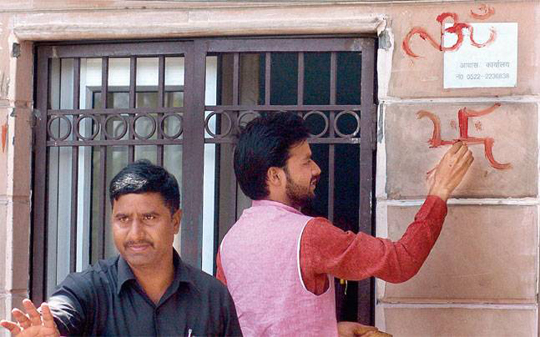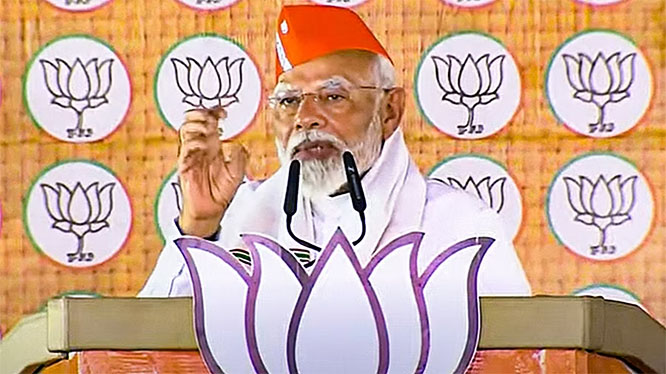New Delhi, Mar 21: Butchers and meat traders in Uttar Pradesh are a worried lot after the BJP's rise to power in the state.
India Today's teams, which spread across UP to gauge the sentiments of the state's meat industry after Yogi Adityanath's ascension as chief minister, found it surrounded by uncertainty and anxiety. Although it's unclear how the Yogi Adityanath administration will crack down on abattoirs, many of them have already worn a deserted look.

On the other hand, residents frustrated with environmental hazards and personal inconvenience caused by slaughter houses expressed happiness with the BJP's promise.
Meanwhile, the fate of a large workforce employed by these abattoirs remains a tricky issue for the new government.
In Saharanpur district, only five slaughterhouses operate legally. But there are countless others that run clandestinely from homes. Israr, a butcher, told India Today that he hoped the Adityanath government would not attack his livelihood.
"First of all, I congratulate this government. Yogi Adityanath is our CM. He's the CM of the entire state. He's good human being," said Israr. "I hope he will work for everyone's welfare. No slaughterhouse should be closed down. Nothing of that sort should happen."
BAN ON ABATTOIRS, BAN ON LIVELIHOOD
In Allahabad, India Today on Monday found locks at the gates of one of the area's major abattoirs. A livestock official, Ashish Goyal, claimed the slaughterhouse had been shut down long back because of violations. Action against illegal abattoirs, he insisted, was an ongoing exercise. But hundreds of meat workers were heard demanding alternative employment. Babu, a meat trader, and workers Sultan and Shahid echoed concerns regarding their future.
The government, they demanded, either back out from ordering closure of their businesses or provide jobs. In the far-off Lakhimpur Kheri districts, slaughterhouse operator Atif made a fervent call for sustenance.
"It's a poor neighbourhood which has been living on this business since 1947. Where will people go if their livelihood is taken away?" he asked. "We are ready to welcome the government's plan. We'll be grateful if some other arrangements are made for us." For Tina and Sonu, students of Deoband's Islamia Degree College, the unbearable stench from the slaughterhouse in the neighbourhood is an assault on their nostrils.
"It's difficult to walk past(this abattoir). The odour is everywhere," complained Tina. "Yes, there's a lot of difficulty. I don't feel like eating because of this bad smell. It turns worse with winds," added Sonu. Mavia Ali of Deoband's town municipality explained no fresh orders have yet been issued to close slaughterhouses. Ahead of the Assembly elections, politics over "pink revolution" had bounced back with vengeance against the state's flourishing meat business after the BJP president Amit Shah vowed to seal off all mechanical abattoirs in the state if his party formed the next government.
PINK REVOLUTION
On the third page of its vision document, the BJP pledges to close down illegal slaughterhouses and ban mechanical. Abattoirs have been in the BJP's line of fire for several years now. But enforcing the proposed restrictions especially on mechanical abattoirs producing meat exports might be a challenge because such facilities are also licensed by the centre.
During his campaign in 2014, Modi slammed the then Congress-led UPA government for spawning a "pink revolution" - a term he used for growing meat exports and state subsidies to slaughterhouses. According to the Agricultural and Processed Food Products Development Authority, the country's exports of animal products stood at Rs 30,137 crore in 2015-16, of which buffalo meat alone accounted for Rs 26,681.56 crore. More than 95 per cent of meat exports come from buffaloes, which do not enjoy the sacred status of cows, whose slaughtering is banned in most of the states.
The surge in the trade is primarily attributed to rising demands in international market. Official data show UP accounts for the highest share of 28 per cent of the country's total population of buffaloes. According to an RTI reply by the Animal Husbandry Department last year, the state is home to the second-largest number of slaughterhouses followed by Maharashtra. Registered abattoirs number 316 in Maharashtra followed by 285 Uttar Pradesh, the RTI response revealed.








Comments
Add new comment